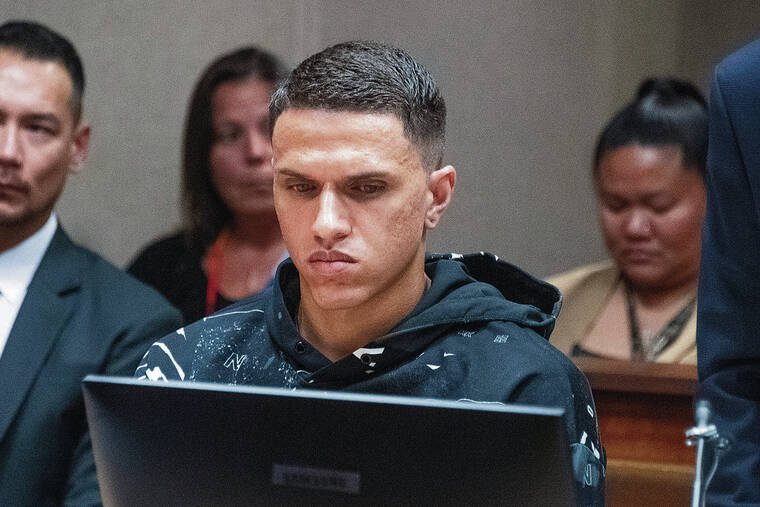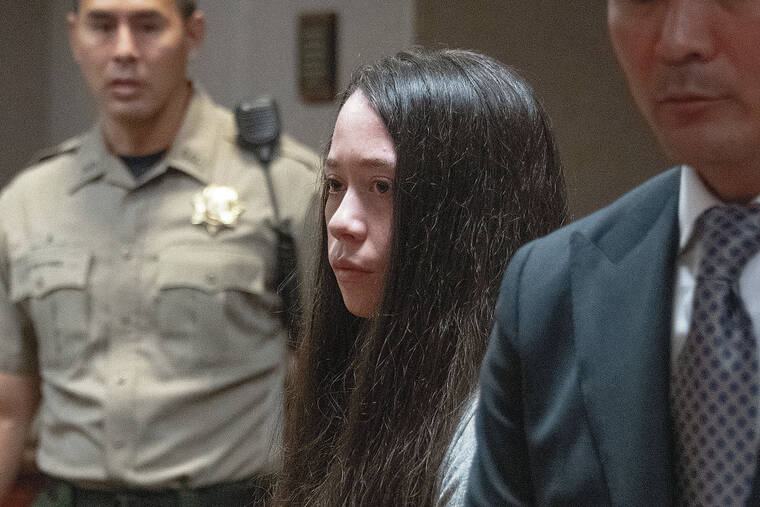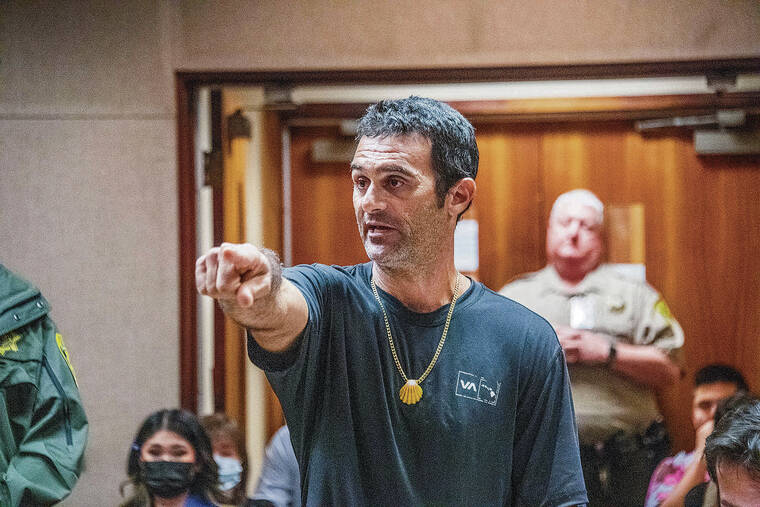North Shore killers get extended sentences

STAR-ADVERTISER
Stephen Brown

STAR-ADVERTISER
Hailey Dandurand

CRAIG T. KOJIMA / CKOJIMA@STARADVERTISER.COM
Kevin Emery, husband of Telma Boinville, who was killed at a vacation rental on the North Shore in 2017, pointed to the witness stand while addressing court Wednesday.



Today marks the sixth anniversary of the 2017 vicious murder of 51-year-old Telma Boinville at a North Shore vacation rental, a day after a 26-year-old woman and a 29-year-old man were finally sentenced in what the judge called “one of the most heinous cases to occur in Hawaii.”
Although Hailey Dandurand and Stephen Brown were convicted in separate trials of second-degree murder, kidnapping of Boinville and her then 8-year-old daughter, and burglary along with other charges, Circuit Court Judge Rowena Somerville handed down extended-term but somewhat different sentences due, in part, to a March 15 Hawaii Supreme Court ruling.
Dandurand received two life sentences with the possibility of parole — one for the murder; one for kidnapping, which was an extended sentence; and 20 years (extended sentence) for the burglary, which is to run consecutively or back to back.
She was also sentenced to one year for the unauthorized entry into a motor vehicle (for fleeing in Boinville’s pickup truck) and 10 years for the unauthorized possession of confidential personal information (for having Boinville’s bank card). Those sentences are to run together or concurrently with the aforementioned sentences.
The judge ordered both to pay restitution of $6,433.35 to the Crime Victim Compensation Fund.
Brown was sentenced to life with the possibility of parole for the murder conviction, to be served consecutively with a 20-year sentence for kidnapping, 20 years (extended term) for burglary, and 30 days for misdemeanor criminal property damage for kicking the inside of a patrol car after his arrest.
Don't miss out on what's happening!
Stay in touch with breaking news, as it happens, conveniently in your email inbox. It's FREE!
His attorney, William Bagasol, said, “He’s getting a life sentence and may be incarcerated for the rest of his life.” He asked for concurrent sentences, blaming Dandurand for the murder.
Although the jury found after Brown’s Jan. 23 extended-term sentencing hearing, which is much like a mini-trial, that he should receive an extended term of imprisonment, meaning life without the possibility of parole, the March 15 Supreme Court ruling found identical jury instructions in the “Lafoga” case were prejudicial and misleading for failing to mention the parole option. (The instructions read that the term would be “extended from a possible life term to a definite life term of imprisonment.”)
The ruling in Lafoga supersedes a 2012 Supreme Court ruling (State v. Keohokapu).
Because the new ruling arose after the jurors’ Jan. 24 decision, but before Brown’s Nov. 1 sentencing, the judge ordered that a new extended-term sentencing hearing would have to take place should the state want to pursue an extended term for the murder conviction.
Deputy Prosecutor Scott Bell could have asked for another jury to seek extended sentencing on the murder charge for Brown.
However, that would have required another trial and putting on witnesses, including Boinville’s daughter Makana Boinville Emery, now 14.
Bell said he consulted with the girl’s father, Kevin Emery, who did not want to have her testify in court for a fourth time.
He said, “It was in the best interest of the victim not to have to subject her to a high-profile setting, and spare the victim the emotional trauma of having to relate details to yet another panel of strangers.”
Emery said his daughter trembled at the thought of even attending the sentencing Wednesday, and that she is afraid to sleep in her own bed and “terrified of what these two have done to her.”
She testified at both trials without looking at the defendants.
Emery gave an impassioned speech before the court, arguing against Brown and Dandurand ever having a chance at parole.
“I don’t have a second chance for Makana to have the comfort to have her mother. … She was 8 years old at the time. Now she’s forced to grow up without a mother.”
“They buried a machete into my wife’s skull, put a bag over her head …”
He said that he was deeply disturbed by seeing a photo of his wife’s mutilated body accidentally left on the witness stand by a previous witness.
Emery said the only reason the pair fled was because of the Australian visitor arriving at the house.
He said that Brown was “licking my wife’s blood off of his hands. It’s so disturbing just thinking about that. And Hailey wearing the earrings I made for my wife for her birthday. She took it off her dead body.”
He said his wife would not even hurt a bug, how she was a role model in the North Shore community “who would uplift everyone around her,” teaching at the local elementary school, always smiling, a proud Brazilian.
Emery’s twin brother and sister also spoke of how the crimes have tortured their family and the entire North Shore community.
“She was kind and humble,” Stephanie Emery said of her sister-in-law.
Brian Emery called the crimes “a demonic act of darkness,” and that it hurts to watch his niece suffering, and his own children and brother suffer.
Somerville said it was one of the most tragic cases to occur in Hawaii, mentioning the numerous multiple objects used to assault her, placing a bag over her head. She said that Boinville’s defensive wounds show that she was most likely trying to protect her 8-year-old daughter.
Neither defendant spoke on their own behalf at sentencing, but Brown’s adoptive parents say he was placed in foster care because his biological mother left him alone at age 6 to care for his 1-year-old sister, changing her diaper and feeding her.
They say he has a caring character and was protective of his little sister. He went through the foster system and they adopted him at age 11.
His father said Brown is a follower of Christ, now attends Bible study, and “is a good person and has a good heart.”
Dandurand and Brown both say they will appeal their convictions.
Dandurand’s trial lawyer, Barry Sooalo, has withdrawn, and attorney Alen Kaneshiro, retained for the appeal, represented her at sentencing.
Dandurand and Brown blamed one another for the murder.
Dandurand alleged Brown was abusive and filed a petition for a protective order in 2020, which was issued in 2023. Kaneshiro had earlier asked the court for his client to appear by video from jail or from a separate courtroom.
The judge denied that, but allowed the defendants to sit in different parts of the courtroom.
Dandurand and her attorney sat in the jury box, while Brown sat at a desk with his attorney.



